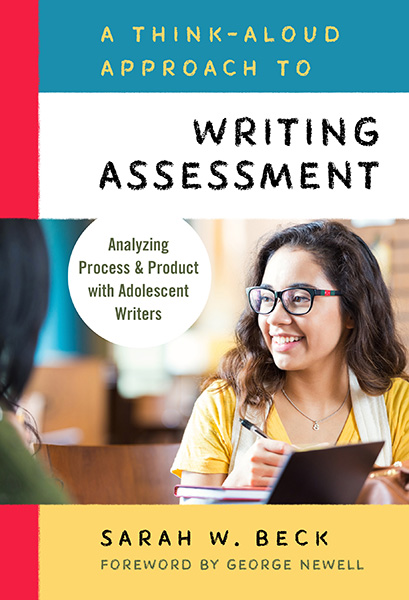Professors: Request an Exam Copy
Print copies available for US orders only. For orders outside the US, see our international distributors.
Foreword by: George Newell
Publication Date: October 24, 2018
Pages: 168
Series: Language and Literacy Series

The think-aloud approach to classroom writing assessment is designed to expand teachers’ perspectives on adolescent students as writers and help them integrate instruction and assessment in a timely way. Emphasizing learning over evaluation, it is especially well-suited to revealing students' strengths and helping them overcome common challenges to writing such as writer’s block or misunderstanding of the writing task. Through classroom examples, Sarah Beck describes how to implement the think-aloud method and shows how this method is flexible and adaptable to any writing assignment and classroom context. The book also discusses the significance of the method in relation to best practices in formative assessment, including how to plan think-aloud sessions with students to gain the most useful information. Teachers required to use rubrics or other standardized assessment tools can incorporate the more individualized think-aloud approach into their practice without sacrificing the rigor and consistency more regulated approaches require.
Book Features:
Sarah W. Beck is an associate professor of English education at New York University, Steinhardt School of Culture, Education, and Human Development.
"This book could easily find its place on the bookshelves of practicing teachers, preservice teachers, and English education scholars, and should be required reading for any Approaches to Teaching Writing course. The think-aloud writing assessment approach she has developed is relatively groundbreaking in its commonsensical simplicity coupled with its possibilities for teachers attempting to navigate increasingly standardized writing instruction and assessment."
—Teachers College Record
“Sarah Beck’s rich and extensive exploration may well be the most comprehensive and detailed account of the role of think-aloud methods in writing assessment. She takes readers through a process for enacting this approach and explores its possibilities in a variety of settings, detailing how both students and teachers can benefit from engaging in this practice, and doing so in ways that allow readers to adapt it to their own situations. This definitive volume should have lasting value to writing teachers and students who may benefit from reflection on their thought processes during the act of composition.”
—Peter Smagorinsky, University of Georgia
"Beck's approach usefully blurs the distinction between teaching and assessment, and describes ways to support writers as thinkers, as well as producers of text. This is the first truly new way of thinking about assessing writing that I have encountered in a long time."
—Heidi L. Andrade, University at Albany-SUNY
"Sarah Beck has written an invaluable guide for using think-aloud formative assessments to gain insight into student writing development. With examples from real high school classrooms and clear explanations, Beck makes a compelling argument for why talking while writing is so valuable to teachers and students. Beck shows how think-aloud assessments support process approaches to writing, independent planning and goal setting, and student ownership of their own writing. This is a book that every high school and college writing instructor should read!"
—Amanda J. Godley, University of Pittsburgh
Tentative Table of Contents
Acknowledgments
Foreword by George Newell
Chapter 1. Introduction: Thinking Aloud as an Assessment Opportunity
Informing Instruction with Diagnostic and Formative Assessment
Dialogic Writing Assessment: A Conceptual Framework
Diagnostic and Formative Potential of Think-Aloud Assessment
Setting the Stage for Think-Aloud Writing Assessment
Conclusion
Chapter 2. Interacting with Students in Think-Aloud Writing Assessment
Enacting Dialogue Through Interaction
The Legacy of Dynamic Assessment
What Does Interactive Think-Aloud Assessment Look Like?
Linking Assessment and Instruction with Think-Aloud Writing Assessment
Think-Aloud Assessment Versus Writing Conferences
Planning and Record-Keeping
Questions Teachers May Have
Conclusion
Chapter 3. What Can Teachers Learn from Think-Aloud Writing Assessment?
A Focus on Individual Student Needs
Learning About Students' Writing Processes
A Refined Understanding of Students' Challenges
Learning About Strengths Within the Writing Process
Using Think-Aloud Assessment to Inform Instruction
Conclusion
Chapter 4. Aligning Think-Aloud Assessment with Instructional Goals
Goal-Setting Is Essential in Formative Assessment
Goal-Aligned Teacher Questions and Prompts
Aligning Think-Aloud Assessment with Instructional Goals
Think-Aloud Writing Assessment Within a Comprehensive Assessment System
Conclusion
Chapter 5. How Think-Aloud Writing Assessment Can Benefit Students
Putting Students at the Center of Formative Assessment
What Students Can Learn from Think-Aloud Assessment
Supporting Students' Learning Through Think-Aloud Assessment
Conclusion
Chapter 6. Think-Aloud Assessment for Teacher Development
Think-Aloud Writing Assessment in Preservice Teaching Experiences
Using Think-Aloud Writing Assessment for Collective Professional Growth
Conclusion: The Dialogic Evolution of Teacher Knowledge
Note
Appendix A
Appendix B
Appendix C
References
Index
About the Author
Professors: Request an Exam Copy
Print copies available for US orders only. For orders outside the US, see our international distributors.